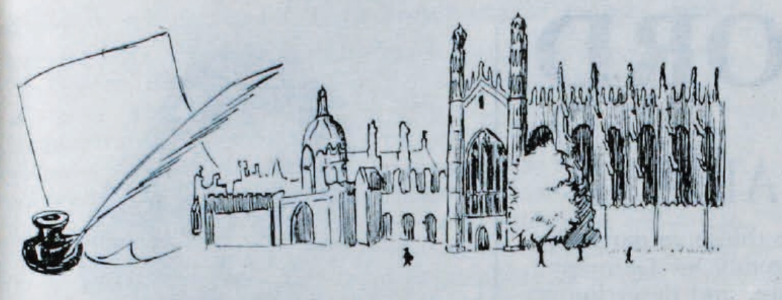
From the Archives: A Cambridge Letter
Excerpted from the 16 May, 1956 Edition of The Isis Magazine
‘Guess Where It’s Heaven to be a Girl!’ the Woman’s Sunday Mirror gushed a short while back; we couldn’t, so read on. Cambridge University, it seems, is this very green eden, offering women students ‘a crazy mixed-up social whirl, with an average of 5oo bottle parties per eight week term. Slightly staggered by such statisties as ‘In her 45 weeks at Cambridge she has had 180 dates with 45 different men’, we skimmed through an account of dating life that would have made the Alpha maidens in Brase New World take to soma, wild with envy.
Varsity, admitting that the Mirror account contained nothing ‘specifically untrue’, cleverly criticised the exag. gerated effect arising from the ‘subtle technique of leaving out’. Leaving out, no doubt, those bluestockinged Cambridge women who brood in the University Library until closing time. Or also, the advice given by the main speaker at a women’s college dinner: cloister yourself in ‘research’ during these three precious academic years; avoid, if pos-sible, anything so distracting as summer jobs; ‘You can always get out in the world later’.
Fresh from the easy-going co-educational school system in America, where boys and girls are not immured in sep-regated public schools during adolescence until they come upon the ‘opposite sex’ with some of the self-consciousness and awe of an amateur anthropologist confronting, for the first time, a mob of orangoutangs (or vice versa), we paused to reflect upon the position of women in Cambridge, upon the man/woman relationship, even.
Apparently, the most difficult feat for a Cambridge male is to accept a woman not merely as feeling, not merely as thinking, but as managing a complex, vital interweaving of both. Men here are inclined to treat women in one of two ways: either (1) as pretty beagling frivolous things (or devastating bohemian things) worthy of May balls and suggestive looks over bottles of Chablis by candlelight, or, more rarely, (2) as esoteric opponents on an intellectual tennis court where the man, by law of kind, always wins.
Is this drastic split in the functions of a whole woman (matter versus mind, one might say) a flaw in the male approach, or does it stem from some lack on the woman’s side? Perhaps a little of both. We shall deal, however, with the former. A debonair Oxford P.P.E. man demurred, laughing incredulously: ‘But really, talk about philosophy with a woman!’ A poetic Cambridge chap maintains categorically: ‘As soon as a woman starts talking about intellectual things, she loses her feminine charm for me. By complaining about such remarks here, we are not advocating abstruse discussions about the animal symbolism in The Garden of Delights, by Hieronymus Bosch, but only a more natural and frequent commerce between male and female minds on their favourite subjects; perhaps in supervisions, perhaps in coffee shops: a sense of fun, not artificial postur-ing, in playing with ideas where a woman keeps her female status while being accepted simultaneously as an intelligent human being.
In a society where men outnumber women ten to one, women are, admittedly, in an artificial position; competition is keen, even deadly, and the difficulty of acquiring a date induces many Cambridge men to draw on the reservoir of blond, monosyllabic Scandinavian girls at the English schools, favouring what is often the prettier, less complicated, side of the pass.
Perhaps a restoration of the old French salon, with each Cambridge girl presiding like Madame Récamier over her ratio of ten men, would enrich male/temale relationships. More likely, co-educational public schools would make intelligent sharing of ideas easier, less self-conscious from an earlier age. At least co-ed university activities such as political clubs, newspaper work, and acting, make it possible for men and women to meet on a sounder basis than the superficial sherry party where a girl is just that, and, alas, not much more. ∎
Words by Sylvia Plath.







